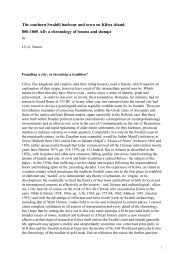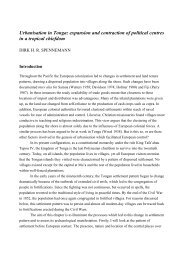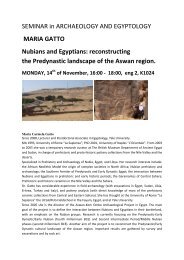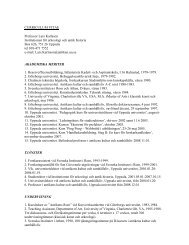Beowulf - Institutionen för arkeologi och antik historia
Beowulf - Institutionen för arkeologi och antik historia
Beowulf - Institutionen för arkeologi och antik historia
Create successful ePaper yourself
Turn your PDF publications into a flip-book with our unique Google optimized e-Paper software.
eciprocal connection between a pair of people, one of whom is more powerful than<br />
the other. The frequency of good rune-stone fathers points to the family as a forum<br />
for this kind of goodness.<br />
The link between generosity and the hall strengthens this interpretation. It means<br />
that the concept existed within the family and that it was developed in the hall as a<br />
social room. From here it was taken out into society as a model for the right social<br />
conduct.<br />
This led to the birth of a good human being who acts as an individual on the basis<br />
of the ideology of the hall in the public interest. When Pagan society meets Christian<br />
society, hall goodness can of course survive, but hardly dominate, society as such,<br />
since it is difficult to deny anybody a good disposition, in spite of the fact that they are<br />
not employing their disposition in a contract of goodness. Sabas’ pacifistic and<br />
steadfast goodness is obviously inspired by the antagonism between a Pagan and a<br />
Christian goodness. Even the ritual aspect of the quality of being good with food may<br />
cause ideological problems in a Christian society where it is difficult to give the communal<br />
meal sponsored by the rich, i.e., those good with food, the status of an official<br />
ritual, once the communion of the Church has been established.<br />
It must have been easy for the Pagan aristocrat to follow God as the supreme<br />
leader, but also difficult to grasp that God nonetheless considered everybody to be<br />
equal, an attitude which enabled him to bestow his ultimate reward, ‘light and Paradise’,<br />
upon anybody. It would therefore seem reasonable for the upper classes first<br />
to connect the word good with appellatives and later to drop it, while keeping the<br />
conduct in connection with worldly affairs. This means that it disappears except in<br />
very special cases, e.g., a good soldier, i.e., a man who in his career continues to be<br />
good due to his willingness to die for what his king or generals believe to be the right<br />
cause, i.e., the actions of the inferior partner in the contract. Eventually he may of<br />
course become a general himself.<br />
In the transition from Pagan to Christian ideology we may in other words expect<br />
new concepts to raise and play a prominent moral role in society. Recent analysis of<br />
the Sagas of the Icelanders and the history of Iceland in the Middle Ages point to<br />
honour and friendship as two such concepts, and in the case of friendship we meet<br />
an institution that harbours many of the ingredients of the goodness-contract.<br />
154<br />
Goodness and Honour<br />
In his analysis of the concept of honour in the Sagas of the Icelanders Preben<br />
Meulengracht Sørensen (1993) has argued that our understanding of the concept<br />
benefits from our seeing it as one concept differently emphasised in different social<br />
situations and among different social groups, rather than two, chronologically, separated<br />
concepts. His analysis is opposed to that of Lindow (1976) or Andersson<br />
(1970), who accept two ideals of honour, one connected with the glory of the war-








